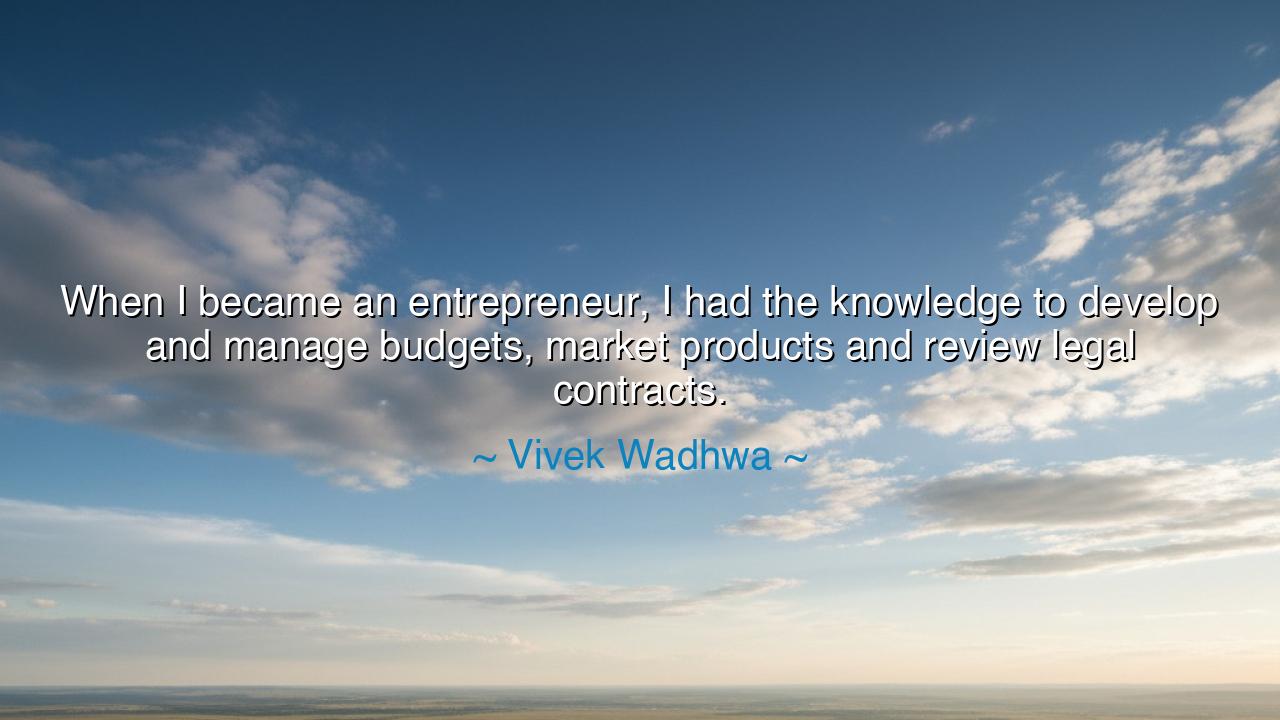
When I became an entrepreneur, I had the knowledge to develop and
When I became an entrepreneur, I had the knowledge to develop and manage budgets, market products and review legal contracts.






Hearken, O seekers of wisdom, to the words of Vivek Wadhwa, who reflected upon the birth of his labors in the realm of commerce: "When I became an entrepreneur, I had the knowledge to develop and manage budgets, market products, and review legal contracts." In these words lies a meditation on preparation, skill, and the fusion of wisdom with action, revealing that the success of any venture rests not merely on ambition, but upon mastery of both practical and intellectual tools.
Since the dawn of civilization, those who sought to create, trade, or govern have understood that skill alone is insufficient without comprehension. In the marketplaces of ancient Athens, merchants measured wealth, weighed risks, and studied agreements before engaging in commerce. In Rome, artisans and traders maintained accounts and contracts, recognizing that knowledge of law and finance was as vital as ingenuity and courage. Wadhwa’s insight mirrors this ancient principle: an entrepreneur must be both thinker and doer, prepared to navigate the complexities of trade, law, and human expectation.
Consider the example of Benjamin Franklin, one of history’s most lauded inventors and businessmen. He did not simply create; he understood accounting, negotiated contracts, and marketed his publications with strategic foresight. Like Wadhwa, Franklin recognized that the mastery of budgets, the skill to market products, and the ability to interpret legal contracts were inseparable from his inventive genius. Without such knowledge, even the brightest idea may wither unfulfilled, undone by practical oversight or misunderstanding.
The essence of Wadhwa’s reflection lies in the recognition that entrepreneurship is a multidimensional art. To innovate is not enough; one must understand the lifeblood of enterprise—the allocation of resources, the appeal of the market, and the safeguard of law. In every venture, budgets determine feasibility, marketing ensures connection with those who will benefit, and legal contracts protect both creator and community. His words remind us that preparation and literacy in these arenas are moral as well as practical obligations for those who undertake responsibility.
History further illuminates this truth. In the Renaissance, merchants in Florence rose to prominence not solely by wealth but through their understanding of accounting, contracts, and trade networks. Lorenzo de’ Medici, though a patron of the arts, maintained meticulous oversight of finances and legal agreements, demonstrating that mastery of these tools underpins not only survival but the flourishing of enterprise and culture alike. Wadhwa’s statement is an echo of this timeless wisdom: preparation empowers vision.
From this reflection emerges a timeless lesson: knowledge is the foundation upon which ambition must stand. The entrepreneur who neglects the mastery of finance, law, or market strategy endangers both vision and legacy. Wadhwa’s words teach that true entrepreneurship requires the union of intellect, prudence, and creativity, reminding all who seek to build that wisdom in execution is as vital as inspiration in conception.
O seekers of wisdom, let this teaching guide your actions. Whether in commerce, scholarship, or personal endeavor, cultivate knowledge of the frameworks that govern your ambitions. Understand budgets, anticipate market dynamics, and honor legal contracts, for mastery in these domains transforms dreams into enduring achievements. Wadhwa’s reflection reminds us that preparation is an act of courage, foresight, and respect for both the work and the world it touches.
Take this teaching into daily life: prepare thoroughly, study diligently, and approach all ventures with both imagination and discipline. By doing so, you embody the timeless truth that human ingenuity, when guided by knowledge and prudence, can create not only wealth or innovation but lasting benefit for society. In the union of skill, vision, and wisdom, the entrepreneur becomes not merely a maker of fortunes, but a steward of human potential and progress.






AAdministratorAdministrator
Welcome, honored guests. Please leave a comment, we will respond soon